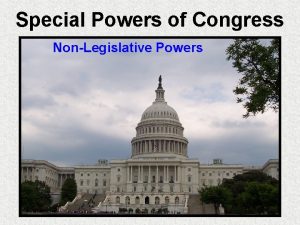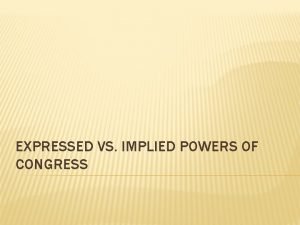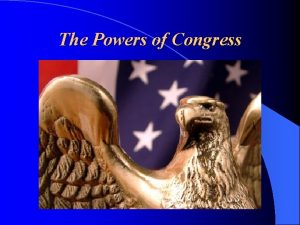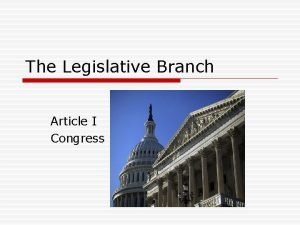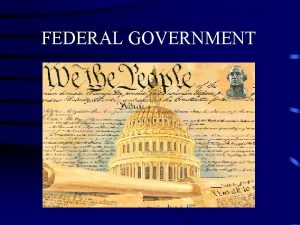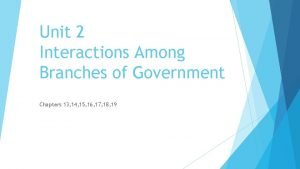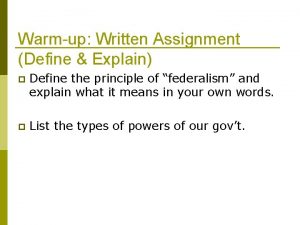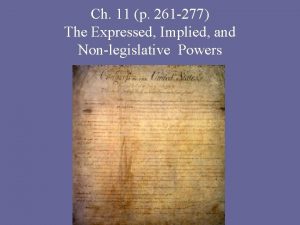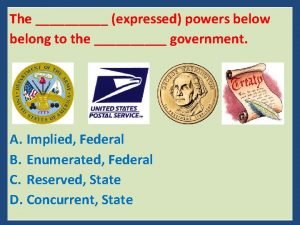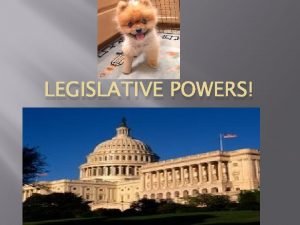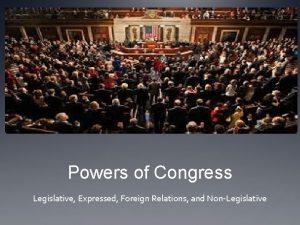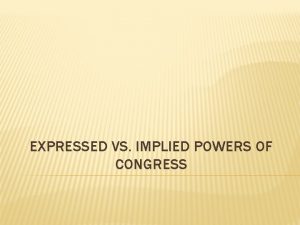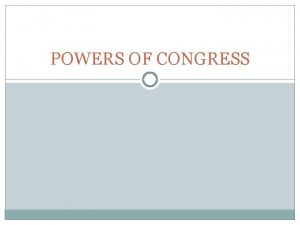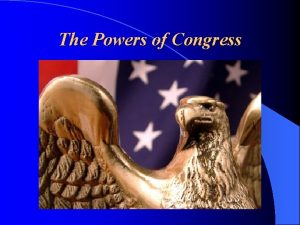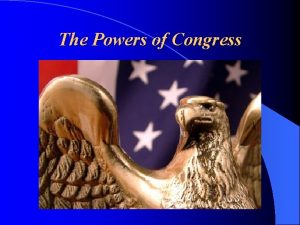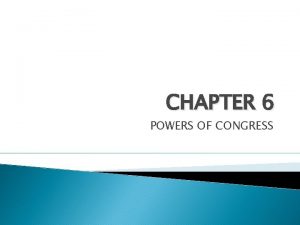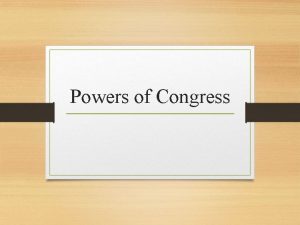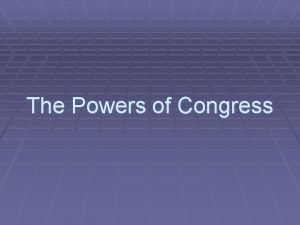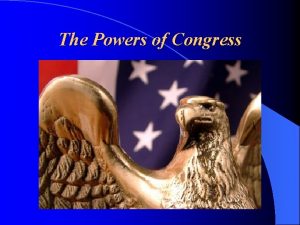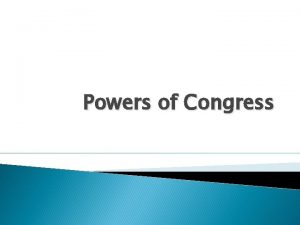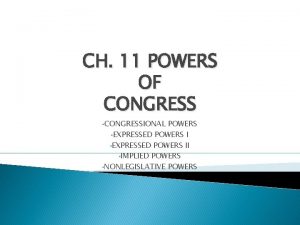POWERS OF CONGRESS Legislative Expressed Foreign Relations and



















- Slides: 19

POWERS OF CONGRESS Legislative, Expressed, Foreign Relations, and Non-Legislative

LEGISLATIVE POWERS A. Expressed Powers - expressly given to Congress in the Constitution - declare war, conduct foreign affairs, coin money B. Implied Powers - powers not specifically mentioned in the Constitution - “necessary and proper “ clause -Jefferson and Strict Construction vs. Hamilton and Liberal Construction

C. Denied Powers - Article I Section 9 lists denied powers - cannot suspend writs of Habeas Corpus - no Bills of Attainder - no Ex Post Facto Laws • Bill of Rights further restricts Legislative power. • 10 th Amendment reserves powers not mentioned for the states.

THE EXPRESSED POWERS A. Power to Tax B. Borrowing Power C. Commerce Power D. Judicial Powers E. Currency Power F. Other Expressed Powers

A. POWER TO TAX • A tax is a charge levied by the government on persons or property to meet public needs. • Limitations on taxes: - may only tax for public purposes - may not tax exports - Direct Tax: paid directly to the government (Income tax) - Indirect Tax: paid by one person, then passed on to another (Sin Tax)

B. BORROWING POWER • Deficit Financing - the Government spends more than it takes in one year • The National Debt - total amount of money borrowed by the government over time, plus accumulated interest

C. COMMERCE POWER • Power of Congress to regulate interstate trade as well as foreign trade. - prevented trade wars between states • Gibbons V. Ogden, 1824 - stated commerce is more than “traffic” it the exchange between states D. Judicial Power • Power to est. courts • Define crimes and set punishment

E. CURRENCY POWER • Legal tender: any kind of money that a creditor must by law accept in payment for debts • Congress 1 st created a national paper currency in 1863, know as greenbacks • no longer on the gold standard, money issued today is backed by the “faith and credit of the U. S. Government”

OTHER EXPRESSED POWERS Copyrights and Patents v Copyright is the exclusive right of an author to reproduce, publish, and sell his or her creative work. - registered by the Copyright Office in the Library of Congress v Patent is a license issued to an inventor granting the exclusive right to manufacture, use or sell his or her invention for a limited period of time. • Bankruptcy Power • Immigration and Naturalization • Postal Power • Weights and Measures

FOREIGN RELATIONS • Federal government has broad powers w/regards to foreign affairs. A. Federal government represents the states’ in foreign affairs - States are not sovereign - 50 different foreign policies would be a problem - President has primary responsibility in foreign relations B. War Powers • Congress has the power to declare war - raise and support an army - maintain a navy • War Powers Resolution of 1973 - Congress claimed the power to restrict the use of American forces in combat areas where a state of war does not exist

NON-LEGISLATIVE POWERS A. Amendments - begin the process B. Electoral duties • If no candidate wins a majority in the electoral college, the election is thrown to the House of Representatives - elections of 1801 and 1825 • 25 th Amendment allows the House and the Senate to confirm the Vice-President

NON-LEGISLATIVE POWERS C. Impeachment • Congress has the power to Impeach Federal officials - H of Rep. can impeach=to accuse and bring charges (majority vote) - Senate acts a judge (2/3 vote) - Chief Justice of the Supreme Court presides • Occurred twice - Andrew Johnson - Bill Clinton - Richard Nixon resigned before charges could be brought

NON-LEGISLATIVE POWERS D. Investigatory Power • Congress can investigate any matter that falls within its legislative powers (Implied) - Impact on proposed legislation - Impact on current legislation - Executive misconduct - Investigate a major crisis

NON-LEGISLATIVE POWERS E. Executive Powers • Senate approves all executive appointments - Cabinet positions - Ambassadors - Supreme Court Justices • Senate also approves all treaties

NON-LEGISLATIVE POWERS F. New States and Territories • Est. rules for admittance • Congress also governs territories - American Samoa, Virgin Islands, Guam, Puerto Rico(Commonwealth status)

Define the following terms using your notes and textbook (Ch. 11, page 290). Expressed powers legal tender Implied powers patent Direct tax copyright Indirect tax National debt Tax 1973 War Powers Resolution of 25 th Amendment

Answer the following questions using your notes and textbook (Ch. 11, page 290). 1. Compare the views of a strict constructionist versus a liberal constructionist. 2. List three powers that are denied Congress. 3. What Congressional power does the case of Gibbons v. Ogden, 1824 fall under? What was the significance of the case? 4. What limitations are place on Congresses ability to tax? 5. Explain how Congress and the President share power in the fields of foreign relations and defense. 6. What War Powers are provided to Congress by the Constitution? 7. Describe the Impeachment process. Who can be impeached? 8. What two Presidents have been Impeached by the House

Study Guide: Test on Voter Behavior, Congress and Powers of Congress 1. What are the two methods for studying voter behavior? 2. Describe how each method impacts how people vote. (Male/Female, religion, age, race, education, etc. ) 3. List Alabama’s Congressional delegation to Washington. (House and Senate + party affiliation) 4. Describe the differences between being a member of the U. S. Senate and a member of the H of Representatives. 5. What are the qualifications for becoming a U. S. Senator and a member of the H. of Representatives? 6. List the leadership in the U. S. House of Representatives. 7. List the leadership in the U. S. Senate. 8. Explain the Impeachment process.

9. What two Presidents have been impeached by the House of Representatives? 10. Name the President that resigned due to the Watergate cover-up. 11. List the Expressed Powers given to Congress by our Constitution. Identify the following terms: Session War Powers Resolution, 1973 Special session 25 th Amendment Congressional District Deficit financing Off-year elections Legal tender Direct tax Indirect tax
 What is a non legislative power of congress
What is a non legislative power of congress Non legislative powers of congress
Non legislative powers of congress Non legislative powers of congress
Non legislative powers of congress Implied powers
Implied powers What are non-legislative powers of congress
What are non-legislative powers of congress Expressed or implied powers
Expressed or implied powers Implied vs enumerated powers
Implied vs enumerated powers Non legislative duties of congress
Non legislative duties of congress Congress legislative branch
Congress legislative branch Legislative branch powers
Legislative branch powers Enumerated/expressed powers definition
Enumerated/expressed powers definition 4 powers of congress
4 powers of congress Interactions among branches of government
Interactions among branches of government Congress informal powers
Congress informal powers President formal and informal powers
President formal and informal powers Describes structure and powers of congress
Describes structure and powers of congress Reserved powers
Reserved powers Expressed powers definition
Expressed powers definition Chapter 11 section 3 the implied powers answer key
Chapter 11 section 3 the implied powers answer key The powers below
The powers below




